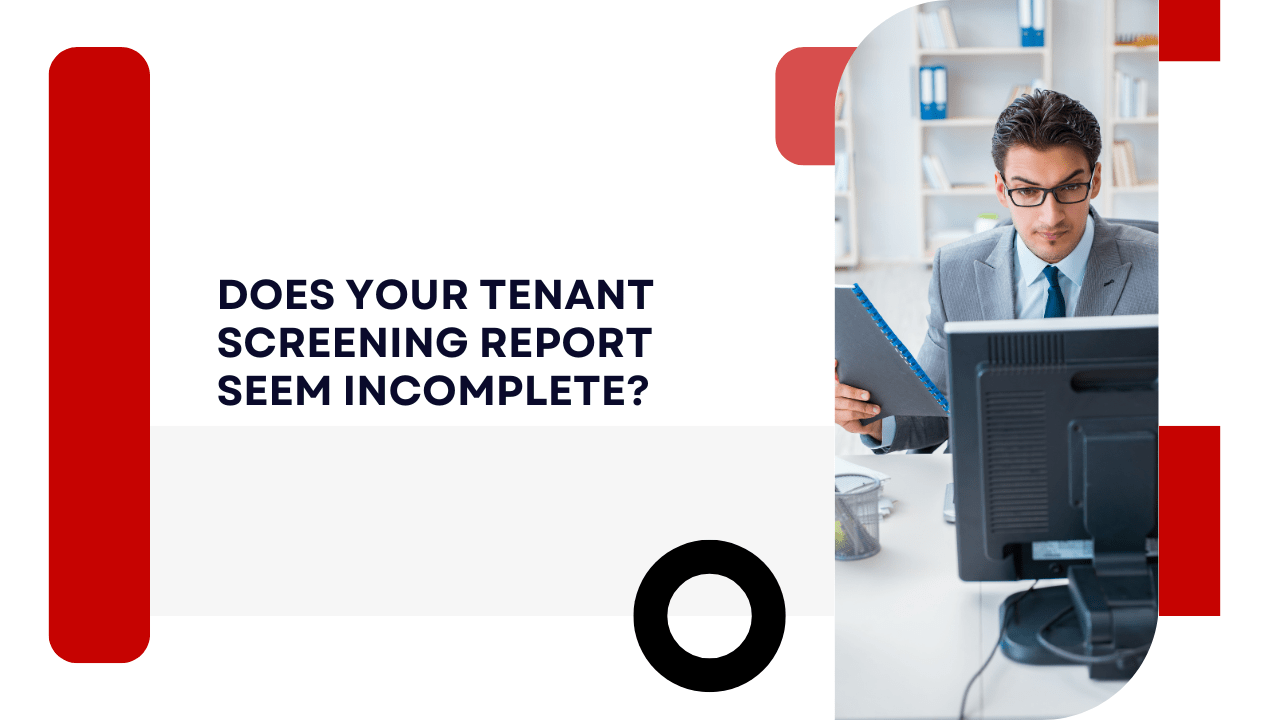Are you worried you might be missing something when you screen tenants?
It’s hard to really know who you’re placing in your property, and that’s why tenant screening is so important. It gets you as close as possible to feeling comfortable with a total stranger taking the keys and promising to pay every month.
As professional property managers, we spend a lot of time screening tenants, digging through data, and staying up to date on fair housing laws and rental requirements. Our screening process is thorough, fair, and consistent. We’re telling you what might be missing from your current screening reports, and what you need to do to gather all of the necessary information when choosing a tenant for your property.
|
Rental History Verification Gaps
Most screening reports will include a section on previous addresses and landlords, but that doesn’t mean the applicant is going to volunteer a full picture of how they behaved as a tenant. Automated databases may list where someone lived, but not whether they paid rent on time, caused damage, or had any disputes with neighbors or management. What’s missing from the application and even the credit report when we’re talking about rental history is:
Actual landlord feedback or references
Information on informal or unreported tenancies (such as sublets or stays with family)
Evictions that approached, but were never formally filed or were settled out of court
Check those landlord references. Ask specific questions, like whether rent was paid on time, if there were lease violations, and whether they’d rent to that tenant again. You’ll get a lot more information with just a short conversation or an email.
Gaps in Employment or Income Verification
Screening reports often show the applicant’s stated income, and some include basic employment verification. But these sections can be outdated, misleading, or too general to be useful. As a landlord, you want to know about recent job changes, and whether there are other part-time or contract jobs that don’t show up as easily as full-time work. A lot of applicants may be self-employed, and that’s going to require a different type of income verification.
As a landlord, you want to be sure your tenant has enough income to pay the rent, and you also want to know that income is consistent and reliable.
Request at least two to three months of recent pay stubs or bank statements. For self-employed applicants, ask for tax returns or profit-and-loss statements. When possible, speak directly with an employer or HR department to confirm details.
Incomplete or Outdated Credit Information
Credit checks are a critical part of any tenant screening process, and it’s usually the starting point for most rental property owners. It’s essential that you do more than glance at the credit score. A little extra research is important because credit reports and credit scores may not always reflect a person's current financial situation, especially if their circumstances have recently changed.
Here’s a look at what might be missing from that credit report, and thus, your screening report:
Recently opened credit accounts
Payments made too recently to show on the report
Context behind poor credit (think medical bills, lots of student loans, or divorce)
Rent payment history (unless reported by a prior landlord or property manager)
Use credit as one piece of a larger puzzle. Ask applicants to explain any issues you see. They will usually be willing to explain an outrageous credit card bill or the struggle they’ve had paying back a student loan with a high interest rate.
A poor credit score paired with an otherwise strong rental and employment history might not be a deal-breaker. Conversely, a great credit score doesn’t guarantee a good tenant.
Evictions Not Captured in Standard Reports
You might be relying on eviction checks to weed out risky tenants. But eviction records are notoriously incomplete. Not all eviction filings make it into national databases, especially if:
The tenant moved out before a judgment was entered
The case was sealed or expunged
The eviction occurred in a jurisdiction that doesn’t report to national systems
You might not have access to informal evictions or lease terminations. It’s possible you won’t know anything about an applicant’s settled or dismissed cases. In some cases, recent filings will not be available in databases, which means you could approve a tenant who is in the process of being evicted.
Supplement the eviction search with landlord references and local court record checks, if available. Some property managers also search local public records for signs of landlord-tenant disputes.
Criminal Records Gaps
A criminal background check is a standard part of most screening reports, but these checks vary in accuracy and scope depending on the provider and jurisdiction. In Virginia, it is legal for you to check the criminal backgrounds of prospective tenants as part of the tenant screening process. You can include criminal background checks in your application criteria and use the results to assess the safety and reliability of applicants. However, this must be done in a way that complies with fair housing laws and does not discriminate against individuals based on protected characteristics
You may not have access to out-of-state or federal offenses and there could be sealed or expunged records. Do your due diligence, and apply your screening criteria uniformly and in compliance with local laws.
Behavioral Red Flags in Applicants
A prospective tenant might look great on paper, but screening reports won’t tell you about how someone interacts with neighbors, treats property, or communicates with management. You might get a sense of their financial and legal background, but not their personal habits or level of responsibility.
This can be frustrating. You don’t know whether they are people who like to stir up conflict and make complaints. They may be at the center of many noise complaints or disturbances. Maybe they have pets that seem fine but actually chew through walls and bite neighbors.
During the screening and showing process, notice how well they communicate. These short and informal conversations you have with potential tenants can give you a sense of their demeanor and communication style. You can also ask previous landlords if they ever received complaints or had concerns beyond what was on paper. Like we said earlier: those reference checks can provide a wealth of valuable information.
Take a Look at Social Media and Online Presence
Social media isn’t included in formal screening reports for obvious legal and privacy reasons, but there is nothing wrong with scrolling through the online profiles of the people you’re considering for a tenancy. Are there photos of them trashing hotel rooms and destroying property? Then they’re likely not the tenants for you.
Look for posts that suggest violent, reckless, or illegal behavior. If your tenant is applying with one dog but you see a post from a day ago that they have six dogs, that could be a problem.
You don’t want to be creepy about it. And you must be careful not to violate fair housing laws. Never make rental decisions based on race, religion, gender, family status, or any other protected class. If you do look at social media, only consider content that directly relates to tenancy issues and be consistent in how you apply this practice.
Tenant Fraud and Identity Theft
 Unfortunately, tenant fraud is on the rise. Applicants may provide fake pay stubs, altered credit reports, or even stolen identities. Many online services make it easy to create convincing documents. It’s important that you have a way to authenticate the submitted materials, and you’ll need a process of confirming that the person applying for your property is who they say they are.
Unfortunately, tenant fraud is on the rise. Applicants may provide fake pay stubs, altered credit reports, or even stolen identities. Many online services make it easy to create convincing documents. It’s important that you have a way to authenticate the submitted materials, and you’ll need a process of confirming that the person applying for your property is who they say they are.
The best way to put your mind at ease is to work with a property management company that screens tenants every day. There are plenty of screening-only services you can use online, but they only go so far in protecting your property. A management company will prioritize finding the right tenant and implementing a robust screening process that includes verifying identity.
A tenant screening report is an essential tool in leasing your home, but even the best reports leave out important context. You’ll get the best results by combining automated screening with property management expertise and proactive follow-up.
By understanding what might be missing and filling in the gaps effectively, you’ll make smarter leasing decisions and set your rental property up for long-term success. A well-screened tenant is worth the extra effort, we know this from experience.
If you have questions about screening tenants, we invite you to contact us at Doud Realty Services, Inc. We provide expert property management in Norfolk, Portsmouth, Hampton Roads, as well as surrounding areas such as Virginia Beach, Suffolk, Chesapeake, and Newport News.


